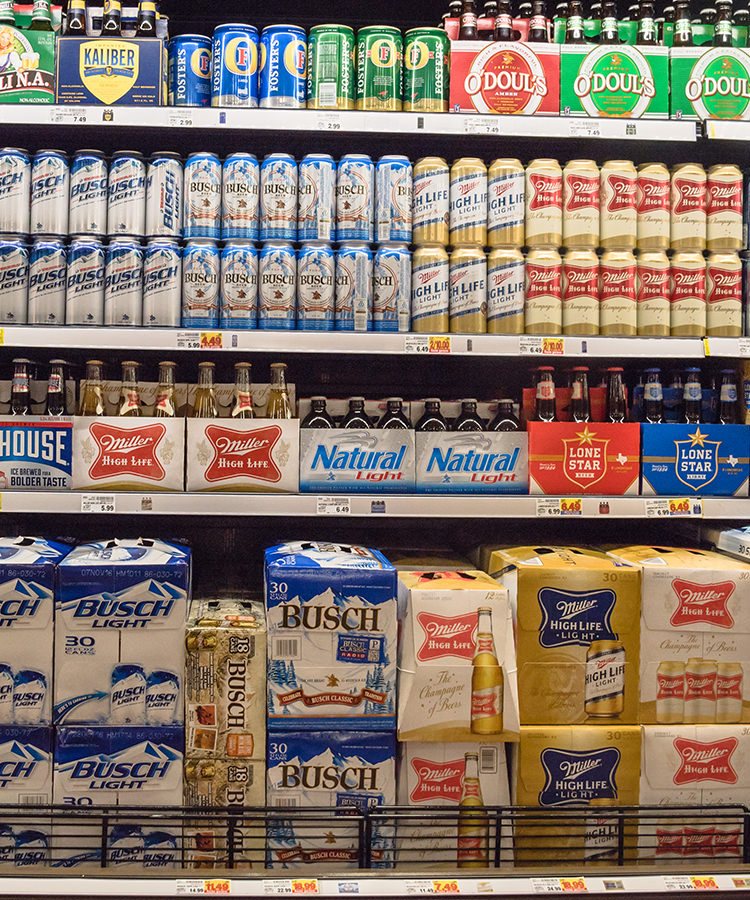The number of individual beer items at U.S. retailers is declining for the first time in five years, according to a MillerCoors blog post cited in the Mark Brown industry newsletter. A research group found that beer options decreased 3.4 percent from the end of 2016 to August 2017.
Most of that is coming from the craft beer sector, and it’s one sign that the doomsayers are right: Craft beer has plateaued. Craft beer options on store shelves around the country decreased 5.7 percent from their peak. Of course, it’s not just craft. Brewers of all sizes have been feeling the squeeze of crowded shelves for years now. In 2014, Joshua Bernstein wrote in Bon Appétit that America having more than 3,000 craft breweries was too much. Now there are more than 5,000.
There are more breweries in the country than ever, which naturally means more products than ever. Not to mention all the experimental brews being made. New and different SKUs, however, are less available in stores.
It’s not the end of the world, but it is something to note as we consider the future of craft beer. Major brewing corporations like AB InBev, Miller, and Heineken have more distribution leverage thanks to their solidified networks. That holds for both macro brands like Bud Light and the craft labels they continue to acquire, like Goose Island and Wicked Weed. Shelves crowded with macro beer’s version of craft means fewer true independent craft options, especially with decreasing SKUs.
Then again, 80 percent of Americans live within 10 miles of a craft brewery. Maybe it’s time to ditch the big-box retailer and hit up the brewery itself.
AB InBev Says Don’t Cross the Border, Sell Beer
AB InBev tells Mexican immigrants and people considering migrating to the U.S.: Don’t. Start a beer store instead. The largest beer company in the world is encouraging Mexicans thinking about traveling to work in the U.S. illegally to stay and open Modeloramas, which sell AB InBev beer brands.
In an AdAge profile of the campaign, Modelorama spokesperson Daniel Haskell called Trump’s intention to build a wall “a great opportunity” for entrepreneurial Mexicans. He added, “Why don’t we launch the brand through an initiative that lets people know in an impactful way that they don’t have to go to the other side of the wall to find opportunity?”
That opportunity is beer. Modeloramas are run by Grupo Modelo, which is owned by AB InBev, and includes brands like Modelo, Corona, Bud Light, Stella Artois, and other large brands. AB InBev products account for around 90 percent of the beer sold in Modeloramas, with the remaining 10 percent coming from partnerships with brands like Coca-Cola, Nestle, and PepsiCo.
It’s good business for Grupo Modelo and AB InBev. There are already 8,000 Modelorama beer stores in Mexico, with 873 new stores in 2016 and 900 new stores so far in 2017. It’s also good business for those potentially interested in becoming business owners.
“The price of crossing the Mexican border illegally increased 130 percent,” the advertisement video states over dramatic bass music and a photo of a border patrol car. “The cost to illegally cross the border to USA varies between 3K and 20K USD,” it follows up with text overlaid on a photo of a family in a desert.
The cost of starting a Modelorama? Around $5,000. Grupo Modelo provides the location, refrigeration, the point-of-sale system, and sets up the supply chain.
“At the end of the day,” one of the Modelorama owners says in the ad, “it’s a business that will leave you money because beer moves on its own.”
It’s hard even for pessimists to cry corporate overlord when AB InBev is offering true entrepreneurship and business opportunity for individuals. Yes, the company is taking advantage of a bad situation. But it’s also making that situation slightly less bad. With everything negative that’s happening in the world, slightly less bad is sometimes as good as it gets — even if slightly less bad means AB InBev strengthening its stranglehold on the global beer market.
Stone Brewing gets distribution in all 50 states
Stone Brewing Company, one of the largest craft beer brands in the country, is officially available in all 50 states. Oklahoma, South Dakota, North Dakota, Wyoming, Mississippi, and, finally, West Virginia all started selling Stone this year, making the brewery a 50-state powerhouse.
What’s also interesting is that 34 countries and Puerto Rico had Stone before West Virginia.
“Our goal has always been to deliver bold and fresh, hop-forward beers to as many fans as possible and we’ve just conquered on major milestone in doing so,” Dominic Engles, Stone Brewing CEO, said according to The Full Pint. “With so many options for high-quality craft beer in every state, it’s an honor to see such a demand for our beers across the entire country.”
Cheers West Virginia, enjoy your Enjoy By IPAs.
